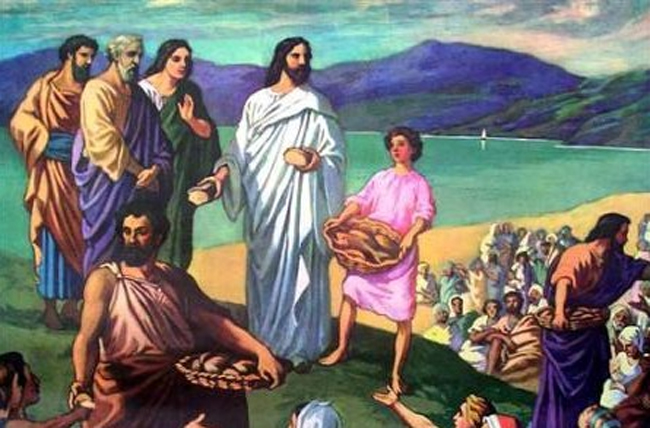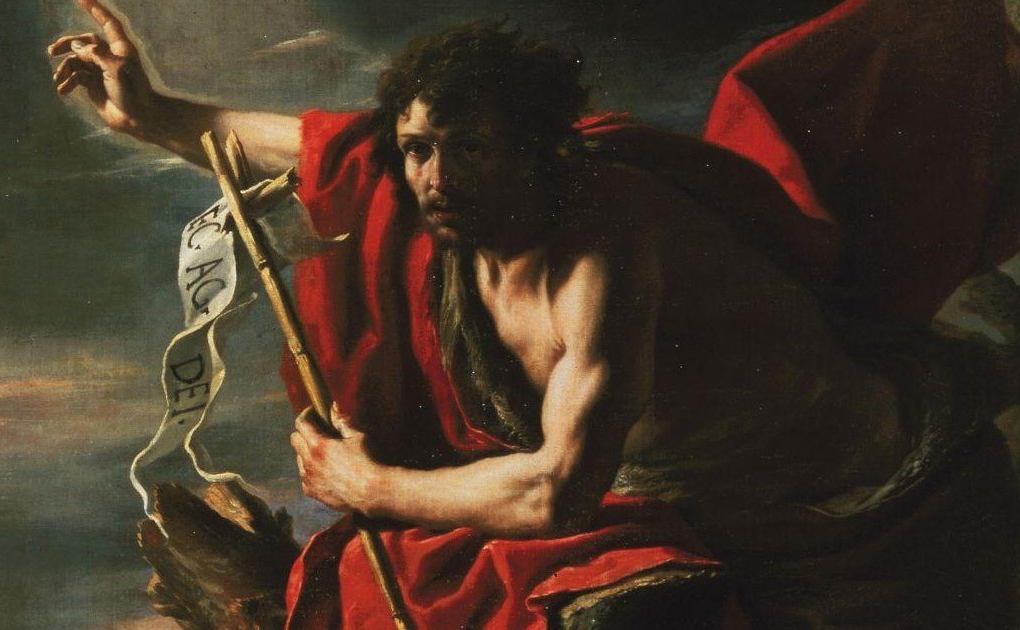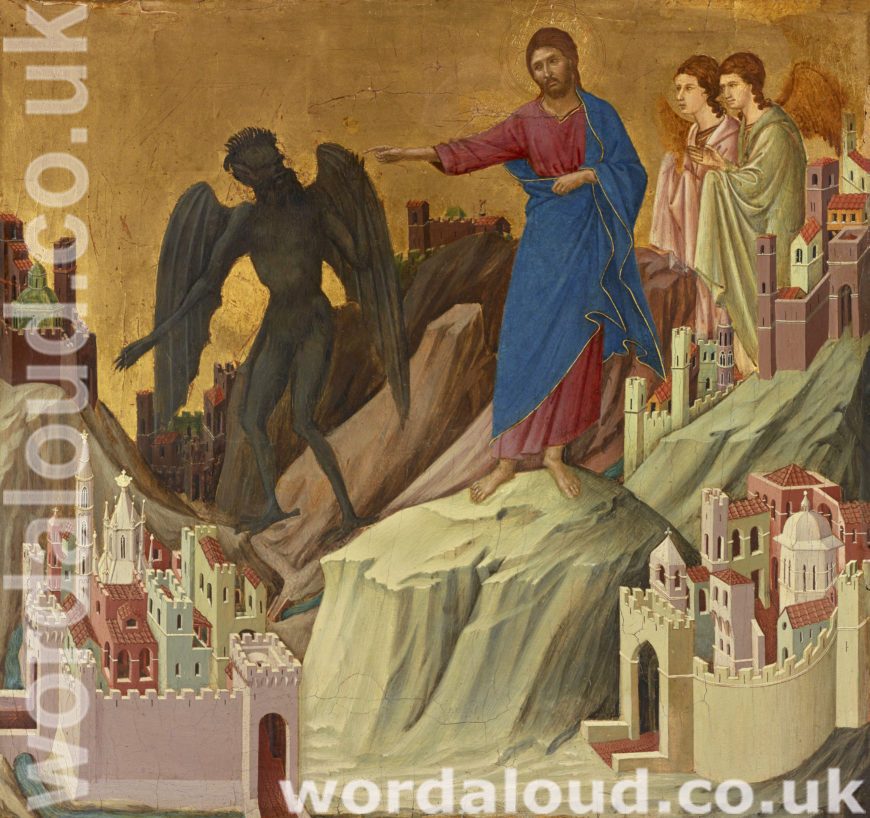Christian Art | Easter To Pentecost | Jesus’ Miracle Of The Loaves And Fishes
John 6: 1-15 Audio Bible KJV | King James Audio Bible | Daily Verses
1 AFTER these things Jesus went over the sea of Galilee, which is the sea of Tiberias.
2 And a great multitude followed him, because they saw his miracles which he did on them that were diseased.
3 And Jesus went up into a mountain, and there he sat with his disciples.
4 And the passover, a feast of the Jews, was nigh.
5 ¶ When Jesus then lifted up his eyes, and saw a great company come unto him, he saith unto Philip, Whence shall we buy bread, that these may eat?
6 And this he said to prove him: for he himself knew what he would do.
7 Philip answered him, Two hundred pennyworth of bread is not sufficient for them, that every one of them may take a little.
8 One of his disciples, Andrew, Simon Peter’s brother, saith unto him,
9 There is a lad here, which hath five barley loaves, and two small fishes: but what are they among so many?
10 And Jesus said, Make the men sit down. Now there was much grass in the place. So the men sat down, in number about five thousand.
11 And Jesus took the loaves; and when he had given thanks, he distributed to the disciples, and the disciples to them that were set down; and likewise of the fishes as much as they would.
12 When they were filled, he said unto his disciples, Gather up the fragments that remain, that nothing be lost.
13 Therefore they gathered them together, and filled twelve baskets with the fragments of the five barley loaves, which remained over and above unto them that had eaten.
14 Then those men, when they had seen the miracle that Jesus did, said, This is of a truth that prophet that should come into the world.
15 ¶ When Jesus therefore perceived that they would come and take him by force, to make him a king, he departed again into a mountain himself alone.
Much of Christ’s early ministry takes place around the Sea of Galilee, also known as the Sea of Tiberius or the lake of Gennesaret. There were a number of towns around the shore of the lake, and the shore was often the setting for Christ’s preaching.
John only tells us specifically of seven of Christ’s miracles, chosen to suit his purpose. He does tell us, in verse 2 of today’s reading and at the end of his Gospel, that Christ performed many miracles, which John calls signs. As he tells us of the miracle of the loaves and the fishes, John clearly connects this with Jesus’ presentation of himself as the bread of life, which follows shortly in this chapter of the Bible.
Many, many people have by this time heard of Jesus and witnessed his miracles, namely the healing of those who were sick. They flock to see him. They have tremendous enthusiasm, though they do not understand who Jesus really is. Through the first half of John’s Gospel, Jesus’ mission builds up tremendous momentum, before the clouds gather and his Passion is at hand. Now, with so many people gathered, Jesus is concerned to take care of the people, providing for their bodily and their spiritual needs. Both spiritually and bodily, the people are hungry.
John tells us that the Passover is near. The seemingly unimportant detail that there is much grass in the place reinforces this: the time must be around the height of spring. Through this, we are taught to relate the miracle of the loaves and fishes to the Christian Passover which Jesus will institute, and also to the Passover of the Old Law, which Jesus supplants. There are clear parallels. In Exodus, the multitude cross the Red Sea; here Jesus will cross the Sea of Galilee. A great crowd followed Moses as they do Jesus. Moses performed great signs. He went up to the mountain, as Jesus goes up to a mountain in these verses. And, in the wilderness, when the Israelites hungered, they received manna, bread of heaven.
While Philip sees no possible solution to the problem, Andrew takes a different approach. He finds a boy who has two fish and five barley loaves. This would be the daily ration for the poor. The boy has handed over his entire daily ration of food. He has given to Jesus all that he has, and it is through this great gift that Jesus will work the miracle of satisfying everyone.
John’s phrasing now is significant: ‘And Jesus took the loaves; and when he had given thanks, he distributed to the disciples…’ We have, then, almost the very same words with which the Synoptic Gospels describe the institution of the Eucharist at the Last Supper. Our understanding of the Eucharist is hereby illuminated. The boy has shared all he has, and through Christ’s divine power over matter everyone is satisfied. We recall these thoughts as we celebrate together and receive the body and blood of Christ.
Once the people have eaten their fill, Jesus is concerned that nothing is wasted. There is thrift here and a spirit of poverty, of respect for the world’s resources. It is also a suggestive moment, as Jesus tells his disciples to gather the fragments of bread. So we are all to be gathered; we are all called to share in the bread of life, which is Christ’s body; there should be no waste; nothing should be lost.
The bread has truly been multiplied. There are twelve baskets of fragments, one for each of the tribes of Israel, all of whom are called to share in the life of Christ, to understand how the Old Law prefigured the New, and to believe the New.
Now the people wish to make Jesus their king. He is the Messiah! This is true, but they are thinking in terms of an earthly, political messianism, that Jesus may be come to lead the Jewish people to victory against the Roman power. Jesus will need to explain, as he does to Pilate, that his kingdom is not of this world. We are asked to consider that Christ’s teaching – that our life in Christ – transcends national and political divisions. We think of all those fragments of bread being gathered. Christ is for everyone. Nothing should be lost.
Lord our God, your Son Jesus fed those who followed him in the desert and they received as much as they wanted. May we know and be convinced that he can fill our own emptiness not just with gifts that fill our need of the moment but with himself, and may we accept him eagerly, for he is our Lord for ever.

![]()
Audio Bible KJV | King James Audio Bible | King James Version | Endnotes
There Is Enough Food For Everyone
This is the miracle of Jesus feeding the multitude with just five loaves and two fish, given to him by a boy. This miraculous event demonstrates God’s provision and abundance, reminding us that there is always enough food for everyone. The passage begins with Jesus and his disciples crossing the Sea of Galilee and coming upon a great multitude who had followed them to hear Jesus speak. Seeing that the people were hungry, Jesus turned to Philip and asked: ‘Whence shall we buy bread, that these may eat?’ (John 6:5, KJV)
Philip’s response was one of doubt and practicality. He replied: ‘Two hundred pennyworth of bread is not sufficient for them, that every one of them may take a little.’ (John 6:7, KJV) Andrew, another of Jesus’ disciples, brought forward a boy who had five loaves and two fishes, but he too was doubtful, asking: ‘What are they among so many?’ (John 6:9, KJV)
Despite the doubts and practical concerns of those around him, Jesus took the loaves and fishes and blessed them, breaking them into pieces and distributing them among the multitude. Miraculously, everyone was fed, and there were even twelve baskets of leftovers – which we might understand as symbolic of the twelve tribes of Israel.
This story of the feeding of the multitude has inspired and uplifted believers. Saint Augustine wrote in his commentary on John that ‘this miracle is a symbol of that bread which was to come down from heaven, and which was to be broken by the passion of Christ for the life of the world.’ For Augustine, the miraculous feeding of the multitude foreshadows the Eucharist, in which the bread of life is offered to all who hunger and thirst for righteousness.
In the Protestant tradition, theologian John Calvin saw in this miracle a reminder that God’s provision is limitless. He wrote in his commentary on John that ‘Christ here exhibits a striking proof of his divinity, that he may raise us to admiration of it’. For Calvin, the feeding of the multitude demonstrates the power and authority of Christ, who can do far more than we can ever imagine or ask.
One lesson of the story is that with giving there can and should be abundance for everyone.
A further lesson is that we should not horde our wealth or claim it as our own, but share freely with everyone.
As Pope Francis has written in his encyclical letter Laudato Si: ‘God has created the world with ample resources for all its inhabitants, and he has given us the capacity to use them in an intelligent and sustainable way.’








